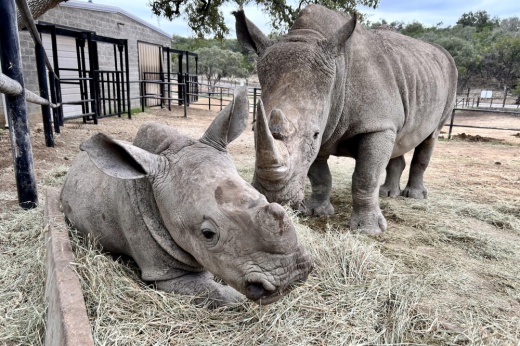The details
White rhinos are endangered, with only about 16,000 remaining worldwide, said Tiffany Soechting, the animal husbandry director at the ranch.
The species faces threats from poaching and habitat loss, Soechting said.
Rudy is one of two calves born at the ranch within a year, which is rare due to the challenges of breeding white rhinos in captivity, according to Soechting.
The ranch’s herd now includes Rudy, his parents, half-sister Truda born last year, another adult female and two young females recently brought from Namibia, Soechting said. The ranch’s large facilities and herd dynamics may contribute to this reproductive success, she said.
“Having two births within less than a year is phenomenal,” Soechting said.
On the day Rudy was born, ranch staff participated in a rhino conservation project in South Africa, Soechting said, which included placing antipoaching tracking tags inside rhino horns to address poaching threats.
Diving deeper
Natural Bridge Wildlife Ranch covers over 450 acres of wildlife habitats and is home to species from every continent except Antarctica, Soechting said.
The facility has 45 species, and approximately half of the animals on-site are considered endangered or at risk.
Soechting stated that the ranch provides visitors with the opportunity to see endangered species up close, fostering education and awareness.
The ranch, which opened in 1984, has expanded multiple times and has over 2,000 additional acres available for future growth, Soechting said.
What’s next?
The ranch aims to achieve similar reproductive success with the younger females recently brought from Namibia, Soechting said.
Visitors can currently observe Rudy and the rest of the rhino herd during their visit to the ranch.
- 26515 Natural Bridge Caverns Road, San Antonio
- www.wildliferanchtexas.com





